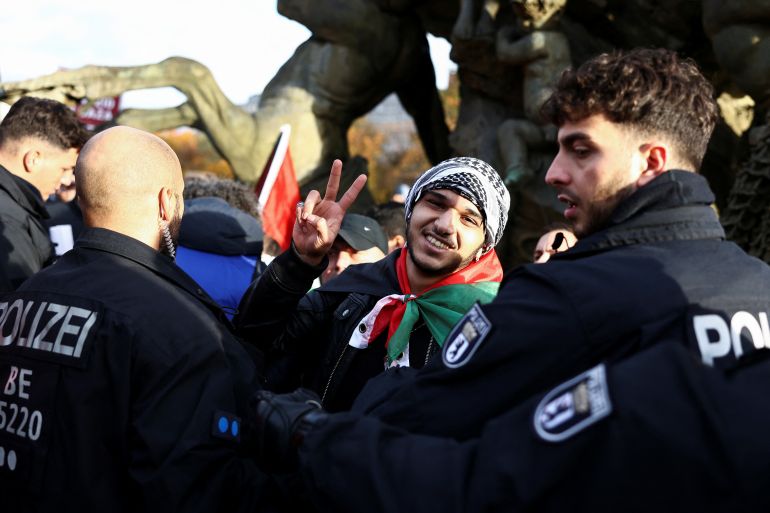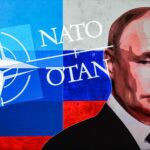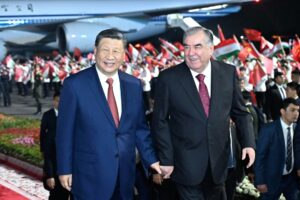Berlin, Germany – Early-afternoon on Saturday in central Berlin, officers led an elderly German woman away to a police van so her sign could be checked.
She was preparing to attend a march calling for a ceasefire in the Gaza Strip.
Her banner, which said she was ashamed to be German and that there was a “genocide” taking place in the densely populated Palestinian enclave being bombarded by Israel.
Police let her and her sign go, and she joined the march.
Later, as the rally got under way, a group of officers in riot gear readied themselves in front of a crowd of chanting protesters.
An estimated 8,000 to 10,000 people marched in the German capital. About 1,000 police were deployed in part to prevent any anti-Semitic speeches or signage.
Until recently, most pro-Palestinian demonstrations were banned in Berlin because local authorities feared an outburst of violence or anti-Semitism. But the decision was criticised as breaching the democratic right to freedom of assembly.
In the past two weeks, several protests have been permitted, including Saturday’s march.

At about 4pm, police pushed into the crowd and, to calls of “shame, shame”, pulled Monika Kalinowska out.
Her sign, written in red, read, “Israel is a terrorist state.”
“I am really starting to question whether we actually have freedom of speech in Germany,” said Kalinowska, who described the episode as exasperating.
After she was frisked and her identification checked, she was told there was nothing wrong with her sign – even though it was confiscated – and she was allowed to leave. She could pick up the sign the next day, police said.
“But the thing that made me really mad was when the policeman asked me if I identified as a woman,” she said. “I was not saying anything illegal and, I mean, if you don’t respect my freedom of speech, how are you going to respect whether I identify as a man or a woman?”
The officer who briefly removed Kalinowska from the protest told Al Jazeera that there was no formal list or any particular guidelines to follow.
“Really, I just use my intuition,” he said. “If I see something I think is bad, we go and get it.”
In another case, a large poster calling German Chancellor Olaf Scholz and Israeli Prime Minister Benjamin Netanyahu “deadly assassins” was taken away.
A group of young Italians were told to destroy theirs, which said, “Stop the genocide. Stop the apartheid.”
“He told me that if I said these things, I could be arrested,” one of the Italians, who requested anonymity, told Al Jazeera.
“No, I didn’t,” the police officer argued back. “I said you could be arrested if you said those things under certain circumstances.”
Asked what those circumstances might be, the officer told Al Jazeera, “I don’t want to get into this with you.”
“There are certain symbols that are forbidden,” said another officer, referring to Germany’s recent ban on Hamas, the Palestinian group that rules Gaza and was behind the deadly attacks in Israel on October 7.
In a statement to Al Jazeera, police spokesperson Anja Dierschke said officers had acted in line with previously issued guidelines on the Middle East conflict and a public prosecutor had been available in the operations room during the protest to answer any legal questions.
In the end, seven offences related to signage were recorded, police said.
While the job of identifying illegal signs is difficult for police, their measures at protests have a “chilling” effect, lawyers at the European Legal Support Center (ELSC), told Al Jazeera.
“People now wonder if what they wear or say will get them arrested or even deported,” said a spokesperson for the ELSC, which provides legal support regarding Palestinian issues and has an office in Berlin.
“The police are basically deciding the law on the street. They seem to have deployed wide discretionary powers, almost declaring a state of emergency, but without any legal basis. It resembles the practices of an authoritarian regime.”
‘It still has to be tolerated’
Germany has what it calls a “special responsibility” to the Jewish people, to Israel and to combatting anti-Semitism because it was responsible for the Holocaust.
The country mainly uses two laws to prosecute the public expression of hate speech.
Section 130 of the criminal code regards incitement against a certain group of people, which has previously been used to combat the glorification of Nazi Germany, Holocaust denial, and anti-Semitic, racist or homophobic hate speech. Punishment ranges from a fine to up to five years in prison.
Section 140 looks at whether crimes are being condoned in a way that incites further violence or disturbs the peace.
But Michael Wrase, a professor of public law and a constitutional law expert at the Berlin Social Science Center, said it is difficult for police deployed at protests to make decisions on whether certain signs and banners break the law.
“It’s a tightrope that everyone is walking,” he explained.
While raising a Hamas flag, for example, is clearly prosecutable, others acts are not.
“Because with some symbols or signs, the interpretation can be quite different according to who is observing them,” said Wrase.
Ultimately, context is key.
For example, chanting, “From the river to the sea, Palestine will be free,” on October 8, immediately after Hamas attacked Israel, killing more than 1,400 people and kidnapping more than 240, could well be seen as celebrating violence as well as inciting more.
However, chanting the same slogan during a “Ceasefire Now” demonstration a month and more than 10,000 Palestinian deaths later has a different context as do signs that say things like “From the river to the sea, we demand equality.”
In mid-October, Berlin’s public prosecutor said the “river to the sea” slogan would be prosecuted.
But the legalities of that decision have yet to be tested in a German court.
In mid-August, a Dutch court refused to prosecute an activist who had used the rhyme in a 2021 speech, saying such charges were unfounded.
While the situation is heated, the law should – as the saying goes – be blind, said Wrase.
Case law in Germany, all the way to the country’s highest court, indicates that freedom of assembly is a priority and that all protesters should first be given the benefit of the doubt, which is why far-right activists can still hold rallies.
“Even if you don’t agree with what people are demonstrating for, it still has to be tolerated,” said Wrase.
“And as a general rule – this is also set by the Federal Constitutional Court – if you have different possibilities to interpret a certain slogan, you should err on the side of interpreting it to be lawful. You have to give the benefit of the doubt to those exercising their democratic freedoms.”‘
‘Chilling’ effect
Thomas Fischer, a former presiding judge at the Federal Court of Justice, the country’s highest criminal court, agreed with Wrase, saying, “Even if an opinion is morally dubious or just plain wrong, the German constitution says you still have the right to express it.”
“Nobody should be using criminal or civil law to ensure that the only opinions expressed are those the German government agrees with,” he said.
For example, criticising the Israeli government and its actions is not anti-Semitic, Fischer explained.
“It would be ridiculous to equate all Jewish people with the government of Israel. That, would, in fact, be ant-Semitic.”
Over the past month, German politicians have called for changing various laws, including those around the right to demonstrate and freedom of opinion.
The idea of withdrawing citizenship, residency, welfare benefits or funding from anyone accused of making anti-Semitic statements has been floated as well as a plan to only allow “native Germans” to protest.
This week, as community tensions boil across Europe as a result of the Gaza war, German President Frank-Walter Steinmeier called on people of Arab and Palestinian heritage to “speak for yourselves and make a clear stand against terror”, a comment that was decried by some as discriminatory because it singled out minority groups.
“It’s too soon to tell what the impact of these calls from conservative politicians will be in concrete terms,” the ELSC spokesperson said.
“But these are racist policies in action. We still have courts of law in Germany, and if necessary, we will go there in order to protect fundamental rights because this blurred situation is extremely dangerous for our democracy.”
Source : AL JAZEERA















